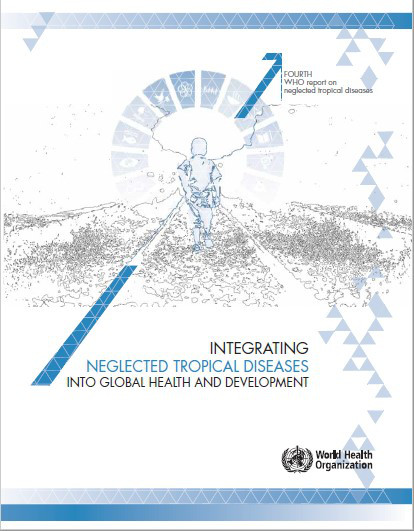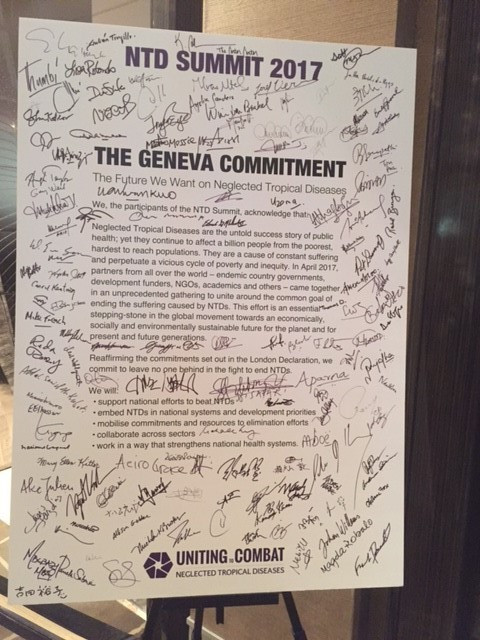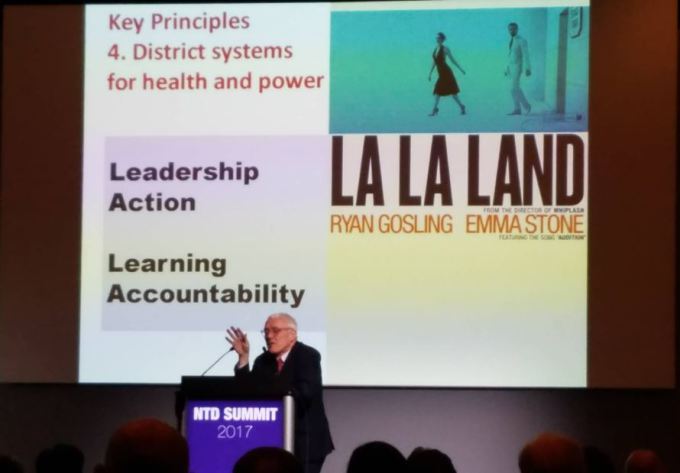
by Dr Suzy Campbell
Integration is the “old/new” global development buzzword: old, because it’s certainly not new! New, because there has been an unprecedented focus on it recently in international commitments, being a key message to emerge at the Neglected Tropical Diseases (NTD) Summit in Geneva, Switzerland last week.

What it’s all about – the 2017 World Health Organization Fourth Report on NTDs
The NTD Summit was organised in conjunction with the release of the World Health Organization (WHO) Fourth Report on NTDs, the fourth anniversary of the London Declaration pledge, and next round of global commitments by international donors, culminating in the Geneva Commitment (see picture) to reaffirm the commitments to fight NTDs that were made in the original London Declaration.

The Geneva Commitment, signed by delegates at the NTD Summit (Photo courtesy: J Vercruysse)
For those NTDs amenable to preventive chemotherapy approaches, the success of integrated delivery of largely donated medicines to alleviate morbidity is without question. Further level of integration within and across the health system needs to continue and it is now time to augment this with tailored activities along with global advocacy. Increased cross-sectoral work is essential to integrate NTD control and elimination programmes within the broader vision of universal health coverage. But, as highlighted by Dr Dirk Engels, Director of the WHO Department of Control of NTDs, integration is extremely complex and no one yet knows enough about what this means. Without doubt, though, NTD development will improve general living conditions, and thus striving for better cross-sector working with integrated solutions is crucial.
Dr Anthony Costello, Director of the WHO Department for Maternal, Newborn, Child and Adolescent Health, gave insight into some guiding principles, namely: approaches must be country-led, have a sound evidence base, be assessable at scale, and have district-level systems. Assessment of programmes at scale is a major current epidemiological challenge - large-scale evaluations are required. Dr Costello then invited us all to join him in “LALA Land” – a novel way to encompass essential parameters of leadership, action, learning and accountability! Recognising the integration challenges, and the importance of continuing to strive to overcome them, Dr Margaret Chan (Director-General, WHO) gave a strong statement of support emphasising that “What gets measured, gets done”. In this she indicates WHO commitment to NTD indicators – if there is an indicator that programmes need to meet, NTD work will continue.

Dr Anthony Costello, Director of the WHO Department for Maternal, Newborn, Child and Adolescent Health
To provide a global tool to integrate, advocate and ultimately address underrepresented NTDs and control efforts (including water, sanitation and hygiene (WASH), vector control, veterinary public health, and care programmes) the BEST Framework was launched. Complementing existing WHO and UN frameworks and strategies, the BEST Framework provides a comprehensive approach for collaborative investment in NTDs for development, and for standardising measurement of these interventions to maximise benefit. Building on the four components of Behaviour, Environment, Social inclusion and Treatment, the framework emphasises the necessity of cross-sectoral work and strengthening systems to improve equity and inclusion, and maximise positive impact of development investments in NTD countries.
With this strongly supported integration theme underpinning the entire Summit, there is much optimism that significant progress will continue to be made in combatting NTDs, even as we tackle the heady issues of elimination for some of them, which already requires refinement of existing strategies. The existing progress in combatting NTDs that has already been made has provided the best possible platform for continued partnership and development.
